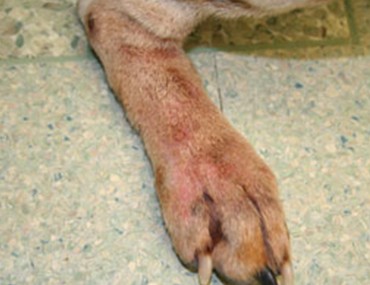
Dr. Justine Lee discusses allergic reactions in dogs. For more from Dr. Lee, find her on Facebook!
Ever have an allergic reaction? The same can happen to dogs too! Allergic reactions are a very common cause for midnight visits to the emergency room for dogs.
Allergic reactions are often secondary to exposure to some type of antigen (an allergen). Unfortunately, we often never know the cause for the allergic reaction, but it can be due to numerous causes such as the following:
 Drugs (like vaccines, medications, antibiotics, etc.)
Drugs (like vaccines, medications, antibiotics, etc.)- Chemicals in the environment (household cleaners like carpet cleaners, air fresheners, etc.)
- Bug bites (due to bee or wasp stings)
- Common natural allergens (like pollen, mold, etc.)
- Anything!
In dogs, signs of an allergic reaction include:
- Puffy face (e.g., swelling of the face and body)
- Hives
- Itchiness
- Redness of the skin
- Agitation/restlessness
- Feeling hot to the touch
Though rare, dogs can experience life-threatening reactions but these are less common. Signs of severe allergic reactions that warrant an immediate visit to an emergency veterinarian include:
- Collapse
- Difficulty breathing due to inflammation or swelling of the throat/airway
- Shock (e.g., an elevated heart rate, low blood pressure)
- Abnormal heart rhythm
Treatment for an allergic reaction typically includes:
- Antihistamines (like Benadryl or diphenhydramine)
- Corticosteroids (like dexamethasone or prednisone)
- And rarely, epinephrine (for severe life-threatening reactions)
In severe cases, epinephrine, oxygen, corticosteroids, blood pressure and heart monitoring, and 24/7 care are imperative for best outcome and survival.
With mild allergic reactions, you can consult your veterinarian about just treating with Benadryl at home (make sure the Benadryl doesn’t have any added other ingredients). The dose of Benadryl is typically 1 mg per pound of weight of your dog (so a 50 pound dog would get 50 mgs of Benadryl).
When in doubt, know what warning signs to look for when it comes to an allergic reaction to keep your pet safe.
If you have any questions or concerns, you should always visit or call your veterinarian – they are your best resource to ensure the health and well-being of your pets.
![]()
